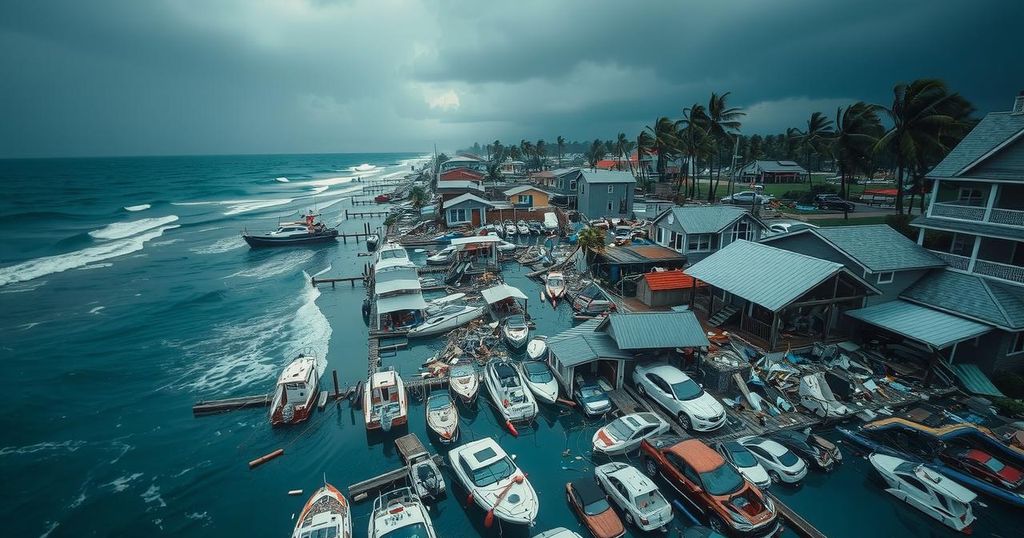Weather
World news
AFRICA, BE, BRIAN MCNOLDY, CARRIACOU, CUBA, DEAN, EVACUATIONS, GULF OF MEXICO, HELENE, HURRICANE, HURRICANE BERYL, HURRICANE SEASON, KATE, MILTON, NATIONAL HURRICANE CENTER, NATURAL DISASTER, NORTH AMERICA, OSCAR, RAFAEL, RITA, SOUTH AFRICA, U. S, UNIVERSITY, UNIVERSITY OF MIAMI, VIRGINIA, WEATHER
Fatima Khan
0 Comments
Overview of the 2024 Atlantic Hurricane Season and Its Impact
The 2024 Atlantic hurricane season ended with 11 hurricanes, surpassing the average of seven, and notable occurrences of hurricanes Beryl, Helene, Milton, and Rafael caused extensive damage and fatalities, highlighting the links to climate change and rising ocean temperatures.
The 2024 Atlantic hurricane season concluded on Saturday, marking a period that witnessed 11 hurricanes, notably surpassing the average of seven. This tumultuous year has been characterized as a “crazy busy” season, significantly influenced by warmer ocean temperatures. A total of eight hurricanes made landfall across several locations, including the United States, Bermuda, Cuba, the Dominican Republic, and Grenada, leaving a trail of destruction far beyond their points of impact, particularly along the Gulf Coast of the U.S.
Hurricane Beryl was exceptional, emerging as the first Category 4 hurricane documented in June, striking the island of Carriacou in Grenada before wreaking havoc in Jamaica. This storm resulted in crop damage and fatalities, with hurricane researcher Brian McNoldy noting its rare occurrence since the last Category 4 hurricane to affect Jamaica was in 2007. Additionally, Beryl became the earliest Category 5 hurricane recorded in the Atlantic on July 1, challenging typical hurricane timelines as major storms are not commonly observed until September.
September saw Hurricane Helene, which was catastrophic, and represented the deadliest storm to impact the U.S. mainland since Hurricane Katrina in 2005, claiming over 200 lives. In North Carolina alone, damages from Helene were estimated to reach at least $48.8 billion, with significant devastation reported across various states, including Florida, Georgia, South Carolina, Tennessee, and Virginia.
October brought Hurricane Milton, which escalated rapidly, achieving wind speeds of 180 mph, marking it as one of the most powerful hurricanes recorded in the Gulf of Mexico, second only to Hurricane Rita in 2005. The rainfall levels in regions affected by both Helene and Milton reached up to three times higher than usual, particularly impacting Asheville, Tampa, and Orlando with record-wetting events during the peak months of the hurricane season.
November’s Hurricane Rafael reached winds of 120 mph, nearing record strength for a November hurricane in the Gulf of Mexico alongside Hurricane Kate from 1985. Rafael struck Cuba while the nation was still attempting to recover from Hurricane Oscar’s aftermath in October, resulting in compounded challenges for the island.
The unprecedented activities of this hurricane season have reignited discussions regarding climate change. Meteorologists attribute the increasing intensity and unusual timing of these storms to the rapid warming of oceanic waters, driven by greenhouse gas emissions. Brian McNoldy indicated that, “I do not ever point to climate change as causing a specific weather event, but it certainly has its finger on the scale and makes these extreme storms more likely to occur.”
This year’s Atlantic hurricane season, with its unusual patterns and significant devastation, emphasizes the urgent need for increased attention to climate change and its effects on extreme weather events.
The Atlantic hurricane season traditionally runs from June to November, during which conditions are generally conducive for the formation of tropical storms and hurricanes. The severity and frequency of these storms are influenced by a variety of atmospheric and oceanic conditions, including sea surface temperatures, which have shown concerning trends due to climate change. The year 2024 was particularly notable for the number of hurricanes and the intensity of individual storms, prompting further scrutiny of the relationship between climate change and hurricane activity.
In summary, the 2024 Atlantic hurricane season has been unprecedented in its intensity, with 11 hurricanes, among which several were historically significant. The patterns observed, particularly with regards to timing and strength, suggest a troubling link to the ongoing impacts of climate change. Enhanced understanding and research into these phenomena are crucial for future preparedness and mitigation strategies as the planet continues to warm.
Original Source: www.wtvr.com




Post Comment